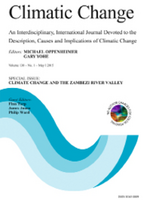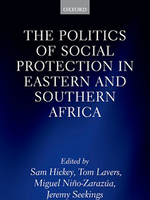Filter by...
Reset all
Publications (33)
Working Paper
pdf
– The cases of Botswana, Kenya, Tanzania, and Zimbabwe
The objective of this research is to assess the extent to which export processing zones in Botswana, Kenya, Tanzania, and Zimbabwe integrate the Sustainable Development Goals in their implementation and operations. We focused on four Sustainable Development Goals—gender equality, decent work...
Working Paper
pdf
In recent decades, the impact of South African foreign direct investment in Africa has been captured by research and policy. This paper investigates linkages and spillover effects of South African foreign direct investment in Botswana and Kenya. The study uses primary data to investigate qualitative...
Journal Article
This peer-reviewed research is available free of charge. UNU-WIDER believes that research is a global public good and supports Open Access.
– Domestic policies, corporate strategies and regional dynamics
Part of Journal Special Issue
Regional Growth Opportunities
Journal Article
This peer-reviewed research is available free of charge. UNU-WIDER believes that research is a global public good and supports Open Access.
– Corporate strategies, investments and agro-industrial policies
Part of Journal Special Issue
Regional Growth Opportunities
Journal Article
This peer-reviewed research is available free of charge. UNU-WIDER believes that research is a global public good and supports Open Access.
Part of Journal Special Issue
Regional Growth Opportunities
Journal Special Issue
This peer-reviewed research is available free of charge. UNU-WIDER believes that research is a global public good and supports Open Access.
This issue contains seven articles addressing the major changes underway in the integration of economies in southern Africa. This special issue is based on the UNU-WIDER project 'Regional growth and development in Southern Africa'. This project aims to develop, in conjunction with important research...
Working Paper
pdf
Botswana’s welfare state is both a parsimonious laggard in comparison with some other middle-income countries in Africa (such as Mauritius and South Africa) and extensive (in comparison with its low-income neighbours to the north and east). Coverage is broad but cash transfers are modest. This...
– Regional integration in southern Africa through supermarkets
Walk into any supermarket and you will find a mix of products to stock the kitchen. It’s easy to assume that many of the goods on offer are sourced locally and from nearby countries. In the region of southern Africa, however, imported goods are often shipped from another continent instead of...
Working Paper
pdf
The ‘affordability’ of new or expanded social protection programmes depends on more than an assessment of the fiscal costs or the poverty-reducing or developmental benefits. Diverse international organizations have shown that programmes costing less than or about 1 per cent of GDP have substantial...
Working Paper
pdf
– The case of the animal feed to poultry value chain
This paper considers findings of studies analysing the development of a regional animal feed to poultry value chain in southern Africa (Botswana, South Africa, Zambia, Zimbabwe). The southern African regional poultry value chain is underdeveloped, although important changes include investments by...
Working Paper
pdf
– A comparison of findings from South Africa, Botswana, Zambia, and Zimbabwe
Since the early 2000s, there has been rapid growth in the number and spread of supermarkets in southern Africa. This paper is a synthesis of key findings of studies undertaken in Botswana, South Africa, Zambia, and Zimbabwe on the expansion of supermarkets and the impact this has had on suppliers...
Research Brief
pdf
– The animal-feed-to-poultry value chain
15-20% of local demand for poultry in South Africa is met by imports Evidence from Zambia suggests that capital investments in the value chain can increase local production Increased demand due to growing urban populations poses critical challenges for local industrialization in southern Africa...
Blog
The UNU-WIDER project on extractives for development seeks to examine how poor and middle-income countries can best use their natural resource wealth to promote development. It is well understood that minerals, metals, oil or gas (collectively known as ‘extractives’) have for some years been...
Working Paper
pdf
– National trajectories and regional integration
This paper explores the linkages between the national systems of innovation of Botswana, South Africa, Zambia, and Zimbabwe and their respective mineral extraction and mineral processing value chains, including input industries. Our analysis reveals four individual national systems of innovation...
Working Paper
pdf
– A comparative analysis of policy frameworks in three Southern African countries
This paper explores the potential to leverage large-scale mineral extraction in Botswana, Zambia, and Zimbabwe to foster mineral beneficiation and upstream industries. The evidence suggests that the success or failure of a resource-based industrialization approach is country and sector specific...
Working Paper
pdf
The animal feed to poultry value chain in the southern African region has seen rapid demand growth owing to increases in urbanization. This growth has been accompanied by the increase in co-ordinated investments by large, predominantly South African, firms across the region. We examine the...
Working Paper
pdf
– Changing models of retailing and the implications for local supplier capabilities in South Africa, Botswana, Zambia, and Zimbabwe
Over the past two decades, southern African countries have experienced rapid growth in the number and spread of supermarkets. Several factors have been attributed to this growth, including increasing urbanization, increased per capita income, the rise of the middle class, economies of scale and...

The articles in this special issue set forth a set of technical contributions that will improve the understanding of the impacts of climate change in developing countries. They are drawn from the Development Under Climate Change (DUCC) project carried out by UNU-WIDER of which the countries of the...
Working Paper
pdf
– The Case of Botswana 1921-2010
In Sub-Saharan Africa we find some of the highest levels of income inequality in the world. Nevertheless, we generally know very little about the historical development of inequality. In this paper we look at how inequality developed in colonial and post-colonial Botswana. We show that income...
Working Paper
pdf
– The Case of Botswana
Botswana has serious environmental problems which, if not addressed, will undermine the attainment of sustainable economic development. This study attempts to determine what aid flows have actually been doing with regard to the environment in Botswana. The results show that although both the...
Book Chapter
From the book:
Achieving Development Success
Book Chapter
– Lessons from Botswana, Ghana, Mauritius, and South Africa
From the book:
Achieving Development Success
Working Paper
pdf
– A Tale of Two Countries
The current paper demonstrates a dichotomy of the growth response to changes in the barter terms of trade, employing as case studies the two African countries, Botswana and Nigeria. Using distributed-lag analysis, the paper finds that the effect of terms of trade on output is positive and negative...

– Contrasting Evidence from Two Countries
The current paper demonstrates a dichotomy of the growth response to changes in the barter terms of trade, employing as case studies the two African countries, Botswana and Nigeria. Using distributed-lag analysis, the paper finds that the effect of terms of trade on output is positive and negative...
Working Paper
pdf
– Lessons from Botswana, Ghana, Mauritius and South Africa
Botswana, Ghana, Mauritius and South Africa are sub-Saharan African countries that stand out for their development progress. Each of these countries has succeeded against the odds, against expectations. This paper synthesizes the common ingredients of these countries’ success, and derives lessons...
Working Paper
pdf
I argue that the economic success of Botswana can be explained by the historical development of its institutions which is related to the trajectory of the Tswana states over the past 200 years. These institutions created a much more stable and accountable government than elsewhere in Africa after...
Working Paper
pdf
– South Africa’s Influence and the Role of Technological Interaction in Botswana’s Diversification Effort
In less than a decade after the end of the apartheid, South Africa has intensified its economic ties with its African neighbours to become one of the top-ten investors and trading partners of many African countries, displacing companies from the former colonial powers in Europe. Among such South...
Book Chapter
– The Case of Three ‘Successful’ African Economies
From the book:
Institutional Change and Economic Development
Working Paper
pdf
– A Comparative Analysis of Mauritius, Botswana and Uganda
This paper examines the relationship between institution building and economic performance in Mauritius, Botswana and Uganda. The rationale for comparing these cases is simple. While the three have been super-economic stars in their own right, they have achieved substantially different outcomes...
Book Chapter
– Relative Success and Comparative Failure?
From the book:
Globalization, Marginalization and Development
Working Paper
pdf
– Relative Success and Comparative Failure
Botswana and Zimbabwe represent two cases of differential access to the world economy. Notwithstanding its lack of diversification and its reliance on a primary mineral export, Botswana has prospered while Zimbabwe has fallen into a deep crisis. Historical and comparative evidence allows us to...
Displaying 32 of 33 results
 Join the network
Join the network